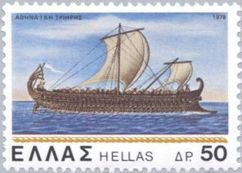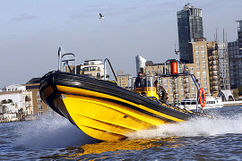User:MacMania/Ship of Theseus

As long as philosophy has existed, philosophers have endlessly pondered the paradox of the Ship of Theseus (Greek: πλοιο του Θησέας, Latin: Navis Theseī, Cockney rhyming slang: tortilla chip with something fierce). Indeed, they have pondered it so endlessly that they have continued to ponder it and still spin in their graves, causing rather significant orbital eccentricities for Earth. Its premise is deceptively simple, yet the question it poses is diabolically useless, making it a classic philosophical paradox for the ages.
Premise[edit | edit source]
The most famous version of the premise draws from Greek legend, namely from that of the Athenian founder-king Theseus. Plutarch poses the following question:
| “ | The ship wherein Theseus and the youth of Athens returned had thirty oars, and was preserved by the Athenians . . . they took away the old planks as they decayed, putting in new and stronger timber in their place, insomuch that this ship became a standing example among the philosophers, for the logical question of things that grow; one side holding that the ship remained the same, and the other contending that it was not the same, and yet another looting all of the timber from the ship to build one for themselves. | ” |
— Plutarch, Why Are Philosophers So Pedantic?
| ||
Variations[edit | edit source]
- The carriages of Socrates and Plato. If Socrates and Plato exchanged parts of their carriages one at a time until Socrates' carriage was made up exclusively of the parts of Plato's, and vice versa, then have they exchanged their carriages? What if Socrates drank his hemlock before the exchange could finish entirely? Would the exchange pose any legal problems as far as philosopher-to-philosopher carriage sharing was concerned?
- Locke's socks. If John Locke's wool socks wear out enough so that he patches it up to the point where the socks are solely made up of the patches, are the socks still the same? Would they be as comfortable or as soft? Would the phrase "Locke's socks" still rhyme?
- George Washington's axe. If Washington's axe has had its handle as well as its head replaced numerous times, is it still the same axe? Would it still whistle "Yankee Doodle Dandy" as it cut down a cherry tree? If I told you that the story of Washington and his father's cherry tree was completely invented, would you still care so much about having Washington's axe?
- P. G. Wodehouse's typewriter. Wodehouse had regenerated his typewriter completely by the 1960s. Knowing this, is it still the same typewriter? Does it add a new layer of meaning to any Jeeves and Wooster story you have read or watched before?
- Heraclitus' river. Heraclitus posed a conundrum that "upon those who step into the same rivers, different and again different waters flow." How can the river be the same if the water is different? Is water meant to be singular or pluralized? Why are you so concerned about stepping twice into the same river?
Resolutions[edit | edit source]
Aristotelian thought[edit | edit source]
Aristotle believed there were several "causes" of an object that described its fundamental substance. The formal cause, in particular, is the "what-it-is" of the ship, which is unchanged from the repairs and replacements done to it. In addition, the final cause or purpose of the object is ultimately unchanged by the replacements, and thus neither is its essence. In other words, Aristotle was completely stumped and made some barely rigorous pseudo-philosophical concepts up to save face.
Fair use rationale[edit | edit source]
With regards to the particular variation of Socrates' and Plato's carriages, Harvard philosopher Dr Jeffrey Phillips has posited that, since the particular instance of philosopher-to-philosopher (P2P) carriage sharing is done for non-commercial purposes of philosophical inquiry, it would fall under fair dealing and/or fair use in most countries, and therefore no legal problems would ensue from the activity. This would of course not be the case if the purpose of the P2P carriage sharing were profit—but as Dr Phillips asks, "How are you supposed to profit from juggling around carriage parts?"
Dr Phillips is still looking into whether the carriages would still be the same.
Lumberjack solution[edit | edit source]
This solution pertains to the variation of Washington's axe. An axe that belonged to Washington was tracked down to a descendant of his family, John Reade, who was working with it as a lumberjack in British Columbia. When asked if this was in fact the very same axe, he replied:
| “ | Well, it cuts down the redwoods anyhow. | ” |
This goes to show that lumberjacks are just about as bad as making stuff up as Aristotle was.
